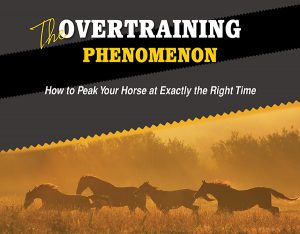The Overtraining Phenomenon – How to Peak Your Horse at Exactly the Right Time
Click here to read the complete article
There are an enticing array of high profile horse shows scattered across the country and the calendar. As a result, it can feel as though you must be at your absolute best for every show. Yet that can take a toll on the physical and mental well-being of both horse and rider. This overtraining phenomenon often leads to a discouraging show experience and can unwittingly spur on even more overtraining, perpetuating the cycle.
Trainers use an assortment of strategies to balance high expectations, yet still have room to peak their horses when it’s needed the most. With so many shows cancelled this year, some “normal” routines for peaking performance have been amended even further.
Deanna Searles
“Nowadays, the level of talent at so many shows is equal to what we see at the World Show or Congress,” says Deanna Searles. “The classes we show in–Trail, Western Riding, and Horsemanship–are top notch. You may have a two-point class and eight of the horses are great.” She says it makes planning the show calendar more difficult than it used to be. “Years ago, you would only peak your horse right before the big shows. Now, all the shows are so very competitive. As a result, we have to stay focused all the time.”
Searles says they are engaged in ongoing preparation throughout the year. This includes teaching the horses what they need to know, as well as incorporating a physical conditioning program. As major shows approach, they start increasing the workouts. “About two-and-a-half weeks out, we get more focused on each individual part of the class. We strive to get a little more precision with each maneuver. We’ll work on transitions. If we’re riding in Trail, we will start elevating the poles a little more, and we work on our steering. We will drill those parts a little harder or a little more intensely than usual. Then, we move on to the next part of our tune-up.” In addition, her goal is to increase fitness and stamina. She continues, “When they are used to doing more work, their attention span increases, their focus is better, they can take all the extra activity that they will have at a show.”
Click here to read the complete article











